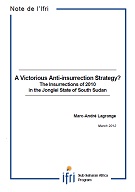A Victorious Anti-insurrection Strategy? The Insurrections of 2010 in the Jonglei State of South Sudan

On May 16 2010, a few weeks after its first elections, the government of the semi-autonomous province of South Sudan (GoSS) had to confront two rebellions in the Jonglei Province. South Sudan may appear unified behind the banner of the SPLM/A, but in fact it is nothing of the kind.
In a context like this, characterized by instability both political and social, the two rebellions in Jonglei are bound to have consequences and they represent a major threat for the recently elected government of a South Sudan currently 'under construction'. In fact, these troubles can irrevocably discredit an armed movement, which is having problems persuading its population to avail itself of the benefits of peace and to establish itself as a credible political player in the eyes of the international community.

Available in:
Regions and themes
ISBN / ISSN
Share
Download the full analysis
This page contains only a summary of our work. If you would like to have access to all the information from our research on the subject, you can download the full version in PDF format.
A Victorious Anti-insurrection Strategy? The Insurrections of 2010 in the Jonglei State of South Sudan
Related centers and programs
Discover our other research centers and programsFind out more
Discover all our analysesAnglo-Kenyan Relations (1920-2024) : Conflict, Alliance and a Redemptive Arc
This article provides an evidentiary basis for postcolonial policy in its analysis of Anglo-Kenyan relations in a decolonization era.
When City Diplomacy Meets Geopolitics: A Framework to Help Cities Navigate Geopolitical Risk
Crises and the increasing polarization of international relations make political risk analysis an indispensable resource for internationally active public and private entities.
The United Nations Mission in Congo or the exemplary uselessness of the United Nations peacekeepers
During the M23 conflict in 2012-2013 in the Democratic Republic of Congo (DRC), the United Nations (UN) took the diplomatic initiative (by initiating the Addis Ababa agreement) and the military initiative (by launching a coordinated counter-offensive with the Congolese army). Since the resurgence of this conflict in 2022, the United Nations, which still has more than 10,000 peacekeepers deployed in eastern DRC, no longer plays any role.
Rebooting Italy's Africa Policy: Making the Mattei Plan Work
Against the backdrop of increasing anti-French rhetoric across parts of Francophone Africa, the relative failure of the counterinsurgency operation in the central Sahel (Operation Barkhane) and diplomatic rifts with several Sahelian countries, Paris has been rethinking its relationship with the continent for several years now. As a former imperial power that has seen its colonial domain in Africa gain independence between 1956 (Morocco-Tunisia) and 1977 (Djibouti), France has invented two successive roles for itself in Africa since 1960, particularly in French-speaking sub-Saharan Africa.








